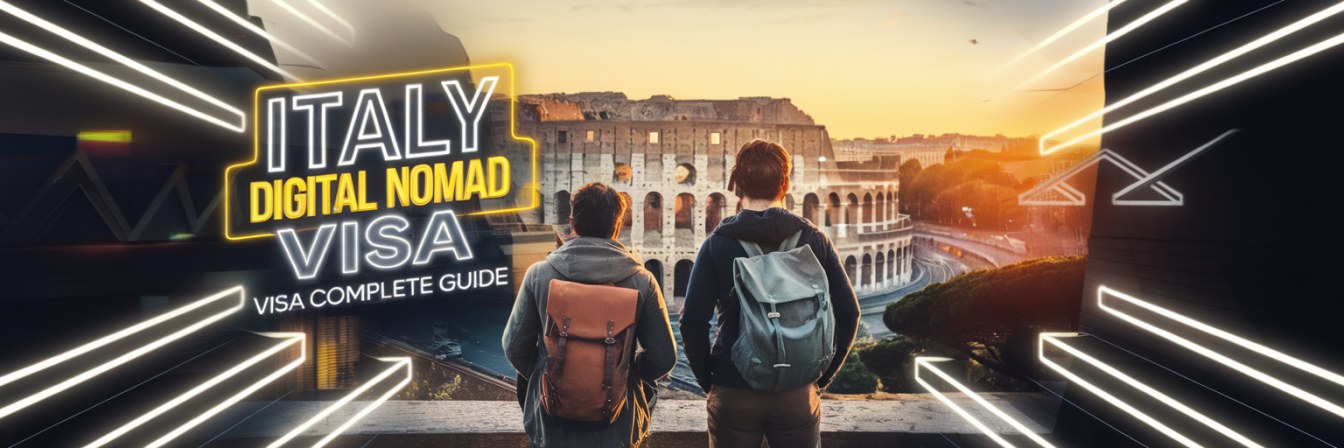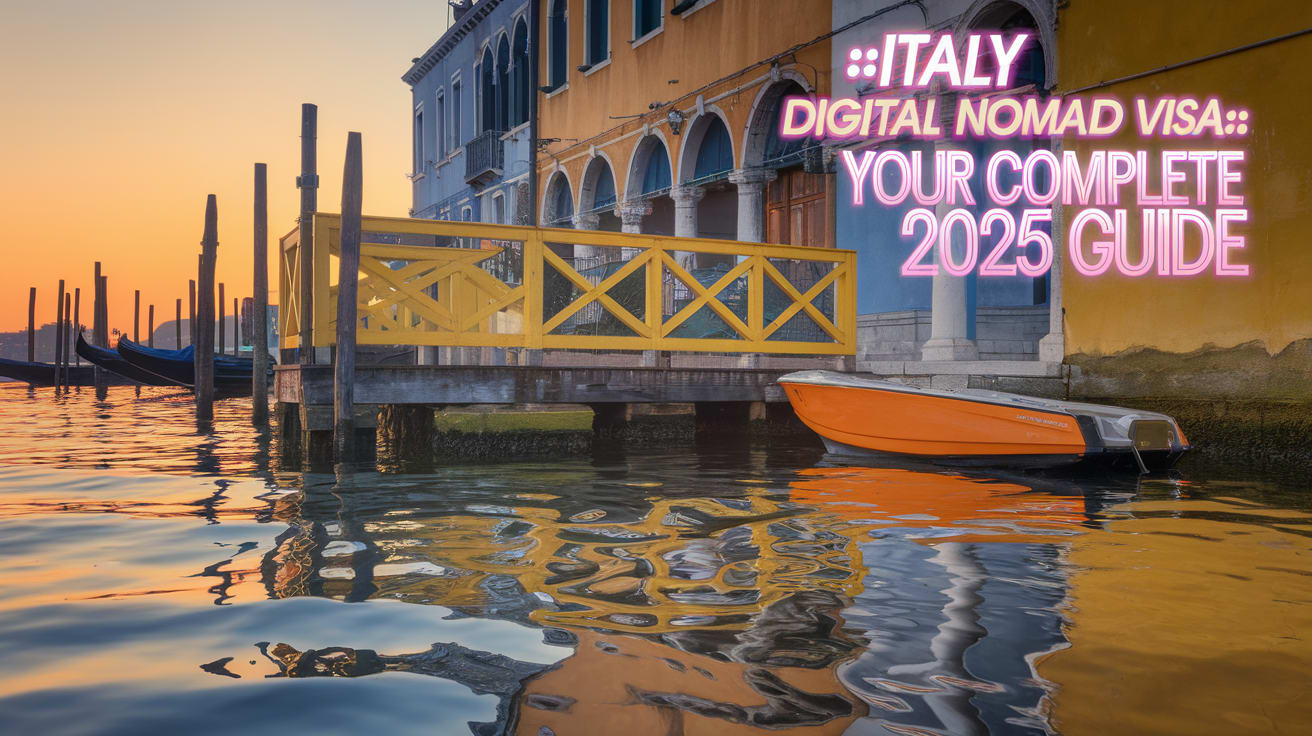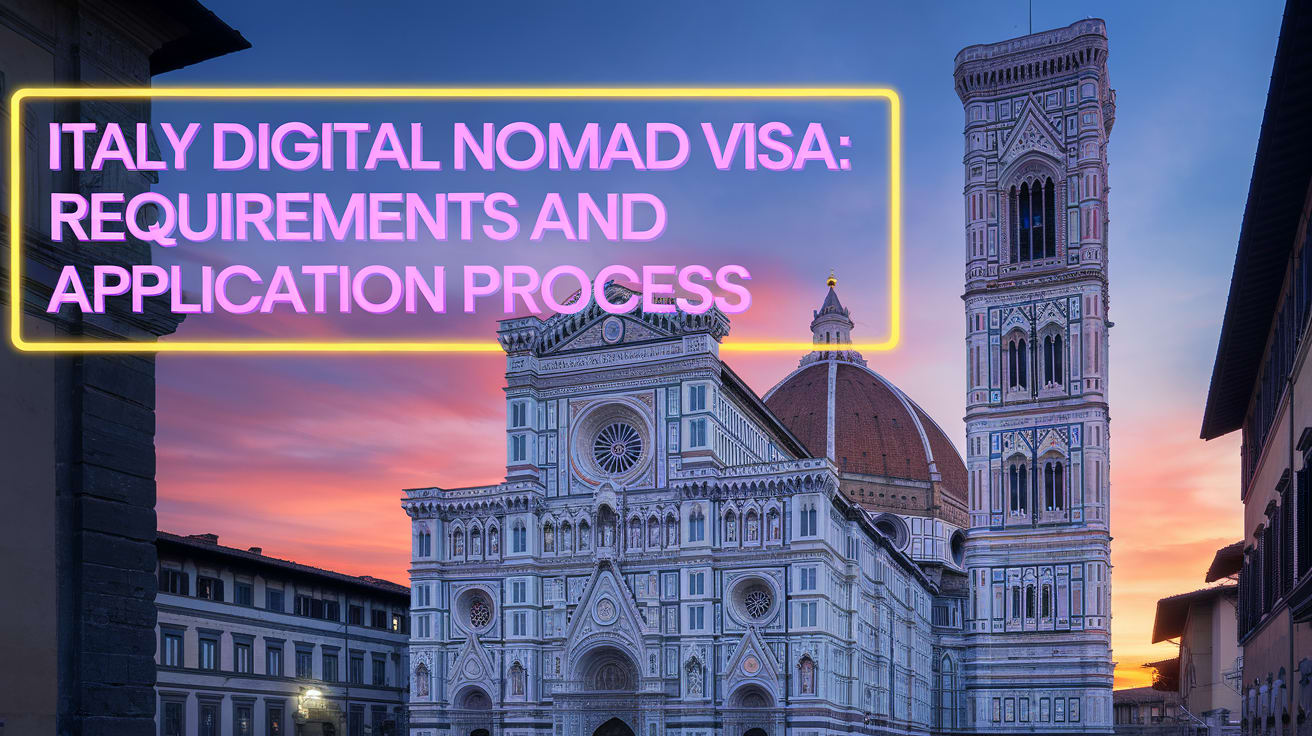Italy Digital Nomad Visa Complete Guide
After years of anticipation, the dream of working remotely from a sun-drenched piazza in Italy is finally a reality. According to the official [Italian Ministry of Foreign Affairs](https://vistoperita...

Italy Digital Nomad Visa: Your Complete 2025 Guide
Authority Insight: We grounded this article in guidance from Wikipedia and Bbc so every recommendation reflects the latest policy and on-the-ground expertise for Italy Digital Nomad Visa Complete Guide.
After years of anticipation, the dream of working remotely from a sun-drenched piazza in Italy is finally a reality. According to the official Italian Ministry of Foreign Affairs, the legal framework for a dedicated digital nomad visa was officially implemented in the spring of 2024, opening a new pathway for remote workers to experience la dolce vita. For years, you might have tried to piece together a long-term stay using tourist visas or complex self-employment routes, always with a return ticket looming. Now, there is a legitimate, long-term option designed specifically for highly skilled professionals who can perform their work from anywhere. This guide cuts through the confusion, providing a clear, step-by-step roadmap to securing your visa and starting your new life in Italy.

An Overview of Italy's New Remote Work Visa
The Italy Digital Nomad Visa, or visto per nomadi digitali e lavoratori da remoto, is a long-stay visa that allows non-EU citizens to reside in Italy for up to one year, with the possibility of renewal. It specifically targets "highly skilled" remote workers, whether they are freelancers with multiple clients or employees of a company based outside of Italy. This visa is a game-changer because it separates remote workers from the traditional, more cumbersome visto per lavoro autonomo (self-employment visa), which often required navigating complex Italian business regulations and quotas.
In 2025, this visa is more relevant than ever. As global work culture continues to embrace remote arrangements, countries are competing to attract top talent and the economic benefits they bring. Italy's entry into this space, though later than competitors like Spain and Portugal, is significant. As detailed by communities on platforms like Nomad List, Italy consistently ranks as one of the most desired destinations for its culture, food, and lifestyle, but the lack of a clear legal pathway was a major barrier. This new visa removes that obstacle, making it a pivotal topic for any remote professional, freelancer, or entrepreneur considering a move to Europe. It’s designed for you if you have a stable remote income, comprehensive health insurance, and a clean criminal record.
What You'll Learn in This Guide
This guide is your comprehensive resource for navigating the entire Italy Digital Nomad Visa process from start to finish. We’ll break down the bureaucratic jargon and provide actionable advice to maximize your chances of success. You will learn: Similar to the Italy Digital Nomad Visa, this visa offers competitive benefits.
- Eligibility & Requirements: A detailed checklist of who qualifies, including the specific income threshold, health insurance mandates, and accommodation proof you’ll need.
- The Step-by-Step Application Process: From gathering your documents and booking your consulate appointment to what to do once you arrive in Italy to get your residence permit (permesso di soggiorno).
- Costs, Fees & Timelines: A transparent breakdown of all the expected costs, including visa fees, insurance, and professional help, plus realistic timelines for approval.
- Pros and Cons: An honest look at the benefits of living in Italy as a nomad versus the potential challenges, like navigating bureaucracy and the tax implications.
- Post-Arrival Checklist: A guide to the critical first steps upon landing in Italy, from registering with the local police headquarters (Questura) to getting your Italian tax code (codice fiscale).
The Journey to the Italian Digital Nomad Visa
The story of Italy's digital nomad visa is one of patience. While the law authorizing its creation was passed back in March 2022, it took two full years for the necessary implementation decree to be signed and published. This long delay created widespread confusion, with many remote workers and media outlets, including Forbes, reporting on the delays and leaving many hopefuls in limbo. But that wait is over. Now that the path is clear, let's break down exactly what you need to prepare for your application.
Italy Digital Nomad Visa: Requirements and Application Process

After years of anticipation, Italy officially launched its digital nomad visa in April 2024, opening the door for remote workers to live and work legally in one of the world's most beautiful countries. But navigating Italian bureaucracy requires preparation. This guide breaks down the exact requirements and the step-by-step application process to help you trade your home office for a view of the Colosseum or the Tuscan hills.
Eligibility and Document Checklist
The Italian digital nomad visa is designed for "highly skilled" remote workers. This means there are specific criteria you must meet, primarily centered around your income, profession, and ability to support yourself.
Who is Eligible?
To qualify, you must be a non-EU citizen who can perform your work remotely. This can be as a freelancer with multiple clients, a business owner, or an employee of a company based outside of Italy. If you're considering other European destinations, check out the Portugal Digital Nomad Visa.
Key Requirements Checklist:
- Minimum Annual Income: You must prove a minimum annual income of at least three times the level required for exemption from healthcare participation costs. For 2024, this amounts to just under €28,000 per year. This income must be derived from lawful remote work activities. You'll need to show bank statements, contracts, or other financial documents to prove this.
- Professional Qualifications: You must demonstrate you are a "highly skilled worker." This can be proven in one of two ways:
- Holding a university degree (bachelor's level or higher).
- Providing documentation of at least five years of professional experience in your current field.
- Comprehensive Health Insurance: You need to have a private health insurance policy that provides comprehensive coverage in Italy for the entire duration of your stay (a full year). Standard travel insurance is not sufficient. The policy must cover all medical expenses and inpatient care.
- Proof of Accommodation: You must have proof of suitable lodging in Italy for the duration of your visa. This could be a registered rental agreement (contratto di affitto) or a deed of property ownership. A simple hotel booking is unlikely to be accepted.
- Clean Criminal Record: You will need to provide a criminal record check from your country of residence and any country you have lived in for a significant period.

Meeting these requirements on paper is the first crucial step. However, Italian bureaucracy is notoriously complex, and simply having the documents is often not enough. To ensure your application is successful, you need a strategy that goes beyond the basic checklist.
Practical Guide: Navigating Your Move to Italy

Securing the Italy Digital Nomad Visa is a significant first step, but the real journey begins with planning your life on the ground. This section provides expert tips, real-world examples, and a clear cost breakdown to help you navigate the process smoothly and avoid common pitfalls.
Expert Tips & Best Practices
Italian bureaucracy has a reputation for a reason. Success lies in meticulous preparation and understanding the unwritten rules. Here are some insider strategies to streamline your application and transition: For a similar visa program, see our comprehensive Malta Digital Nomad Visa guide.
- Become a Documentation Master: Assume every document you submit will be scrutinized. Get professional translations for all non-Italian documents and have them apostilled or legalized as required by your local Italian consulate. Create a digital and physical folder with multiple copies of everything: passport, financial statements, client contracts, and accommodation proof. Check the specific requirements of your designated consulate, as they can vary slightly.
- Prove Your Financial Stability Conclusively: The income requirement is strict (around €28,000 annually). Don't just show a single bank statement. Provide at least six months of statements, signed contracts with clients projecting future income, and a letter from your accountant (if you have one). The goal is to paint a clear, undeniable picture of stable, ongoing remote work income.
- Nail the Accommodation Requirement: This is a classic "chicken-and-egg" problem. You need proof of lodging to get the visa, but it's hard to rent an apartment without being in Italy. A common successful strategy is to book a cancellable long-term stay (1-3 months) on a platform like Airbnb and use the official receipt as your proof. Another option is a "letter of hospitality" (dichiarazione di ospitalità) if you have friends or family in Italy willing to host you.
- Don't Skimp on Health Insurance: The visa requires private health insurance valid for a full year that covers all medical expenses in Italy. A simple travel insurance policy will not suffice. Look for comprehensive expat health plans from providers like Cigna Global or similar international insurers. Your policy document must explicitly state coverage across Italy with no major deductibles.
Real-World Scenarios & Lessons Learned
Learning from others is the best way to prepare. Here are two common applicant profiles and their outcomes.
Case Study 1: The Proactive Planner
- Profile: Sarah, a 32-year-old freelance graphic designer from the USA.
- What She Did Right: Sarah started her process six months before her desired move date. She hired an Italian immigration consultant to review her paperwork. She consolidated her income into one business bank account for three months to show clear, consistent earnings above the threshold. For accommodation, she booked a 90-day Airbnb in Florence and submitted the detailed invoice with her application. Her health insurance policy was a comprehensive plan specifically for expats in Italy.
- Lesson Learned: Proactive planning and professional guidance, while an added cost, can be the difference between approval and rejection. Sarah’s application was approved in under 90 days because there were no ambiguities for the consulate to question. You might also be interested in our guide to the Portugal D7 visa passive income.
Case Study 2: The Scrambler
- Profile: Mark, a marketing manager for a tech company, also from the USA.
- What Went Wrong: Mark tried to rush the process two months before his lease was up. He submitted three months of personal bank statements that mixed his salary with other transactions, making his income stream unclear. He used a standard travel insurance policy, which was immediately rejected. For accommodation, he provided a simple one-week hotel booking, which was deemed insufficient.
- Lesson Learned: Cutting corners on key requirements like insurance and proof of stable finances is a primary reason for denial. The consulate needs to see a well-prepared applicant who is serious and financially capable of supporting themselves for a year in Italy.
Further Reading & Sources
- En.Wikipedia.Org – Portugal
- En.Wikipedia.Org – Travel Visa
- Bbc.Com – News
- Cignaglobal.Com
- Getgoldenvisa.Com – Portugal Golden Visa Program
- Globalresidenceindex.Com – Portugal Golden Residency
- Nomadgate.Com – Portugal Golden Visa Guide
- Portugalcitizenship.Org – Portugal Golden Visa
- Portugalpathways.Io – Definitive Guide For Portugals Golden Visa In 2025
- En.Wikipedia.Org – Portugal Golden Visa
- Henleyglobal.Com – Portugal
- Getgoldenvisa.Com – Constitutional Concerns Surround Portugals Citizenship Proposal
- Wise.Com – Portugal Golden Visa
- Nomadcapitalist.Com – Portugal Golden Visa
- Goldenvisas.Com – Portugal
Final Reminder: Stay compliant with Italy Digital Nomad Visa to protect your move.